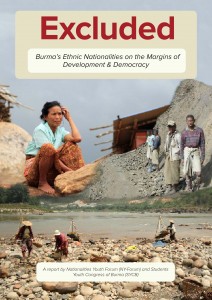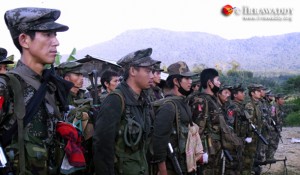Posts Tagged ‘Ethnic Nationalities’ (218 found)
Declaration of Recognition and Support for the Kachin Independence Organization (KIO)/ Kachin Independence Army (KIA)
We, the undersigned Kachin communities and organizations worldwide, officially declare in solidarity that we adamantly recognize and support the objectives, goals and actions of the KIO/KIA government. We would like it to be absolutely clear that the KIO is the only legitimate […]
• • •Deciphering Myanmar’s Peace Process: A Reference Guide
The new nominally civilian government is making serious efforts to achieve peace in Myanmar after more than 60 years of civil war. Peace is critical for ending human suffering and achieving stability; a precondition for overcoming poverty, ensuring long term development and protecting
• • •Statement of Kachin Independence Organization
It has been noted that the Myanmar Government’s Media Department issued a statement on 18th January 2013. In this statement they announced that Government troops would cease their offensive around the Laja Yang area at 6:00am, 19th January 2013 […]
• • •Kachin Organization’s Statement on Thein Sein Government and Burmese Army Airstrike Attacks Against Kachin Civilians and KIO/KIA
Since June 2011, Burmese troops started war against Kachin Independence Army (KIA) as Union Solidarity and Development Party (USDP) became a government after 2010 election. Kachin Independence Organization the political wing of KIA sincerely conduct peace talk […]
• • •New Survey: Communities Across Burma Denied Voice in Mega-Projects
The Students and Youth Congress of Burma (SYCB) and Nationalities Youth Forum (NY-Forum) have released a new report entitled “Excluded: Burma’s Ethnic Nationalities on the Margins of Democracy and Development.” The report documents evidence that ethnic nationalities directly affected by development projects in Burma are systematically denied their right to free, prior, and informed consent (FPIC), and are forced to bear the brunt of these projects […]
• • •Excluded: Burma’s Ethnic Nationalities on the Margins of Development and Democracy
 This report presents documented evidence that ethnic nationalities directly affected by development projects in Burma are systematically denied their right to free, prior, and informed consent (FPIC). While development related abuse has been well documented, no report has shed light on the staggering scale of the widespread denial of participation rights in Burma […]
This report presents documented evidence that ethnic nationalities directly affected by development projects in Burma are systematically denied their right to free, prior, and informed consent (FPIC). While development related abuse has been well documented, no report has shed light on the staggering scale of the widespread denial of participation rights in Burma […]
Statement of 4th Meeting of Central Standing Committee of 14th Congress
The KNU Supreme Headquarters was able to hold well the 4th Central Standing Committee meeting from October 31to November 20, 2012 in the KNU area of Pa-an District […]
• • •Report of the Special Rapporteur on the Situation of Human Rights in Myanmar
The mandate of the Special Rapporteur on the situation of human rights in Myanmar was established by the Commission on Human Rights in its resolution 1992/58 and extended most recently by the Human Rights Council in its resolution 19/21 […]
• • •The Six-Point Political Program of the Ethnic Nationalities Regarding the Peace Process
The following six points were agreed to at the Ethnic Nationalities Conference that was held from 14 to 16 September in Chiang Mai, Thailand. The conference was attended by 130 ethnic political leaders, representatives from civil society and armed ethnic groups. This “political roadmap” is their alternative to President Thein Sein’s eight-point peace plan […]
• • •A Long Way to Go for People in Burma’s Ethnic Areas
 Leaders of ten ethnic and opposition political parties met with President Thein Sein this week for the first time. The meeting in Naypyidaw afforded the opportunity for the MPs to raise key issues, including the rule of law, changes to the electoral system and peace building. However, the government’s response to an MP’s request for the inclusion of ethnic languages and literature in school curriculum was illustrative of how it views the rights of ethnic people and minorities.
Leaders of ten ethnic and opposition political parties met with President Thein Sein this week for the first time. The meeting in Naypyidaw afforded the opportunity for the MPs to raise key issues, including the rule of law, changes to the electoral system and peace building. However, the government’s response to an MP’s request for the inclusion of ethnic languages and literature in school curriculum was illustrative of how it views the rights of ethnic people and minorities.
Railway Minister and Thein Sein’s chief negotiator with armed ethnic groups, Aung Min, said that the government would allow teaching the Mon language and would provide US$1 million to fund it. However, Banyar Aung Moe, an Upper House MP for the All Mon Regions Democracy Party said, “[Aung Min] told us that the teaching time would be out of school hours. I am not satisfied with this as our party proposed allowing teaching in the government’s school time.”
Also this week, the speaker of the Lower House of Parliament, Shwe Mann, reportedly told Banyar Aung Moe that the government agrees to set up a federal union at some point in the future in order to achieve peace. However, when looking at the reality that ethnic people face, it is easy to take such comments as those from Aung Min and Shwe Mann as little more than empty placations […]









 All posts
All posts